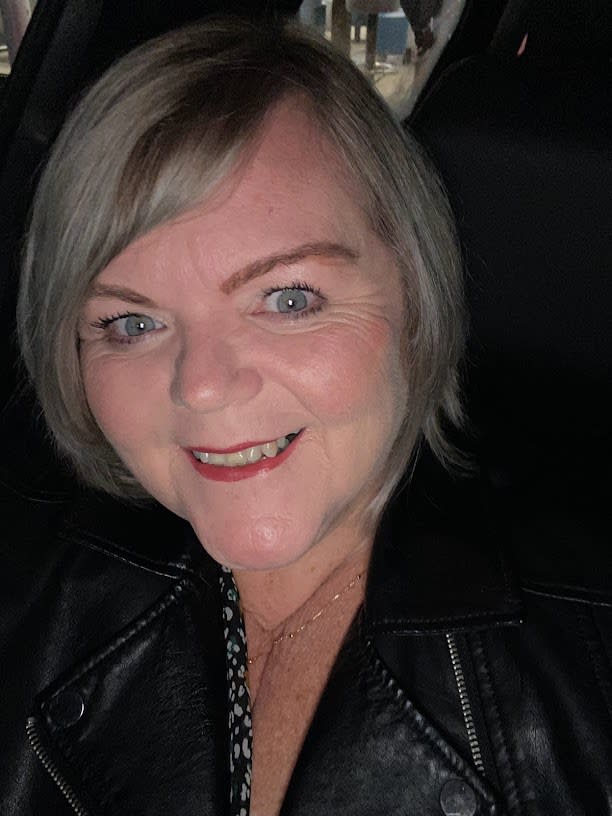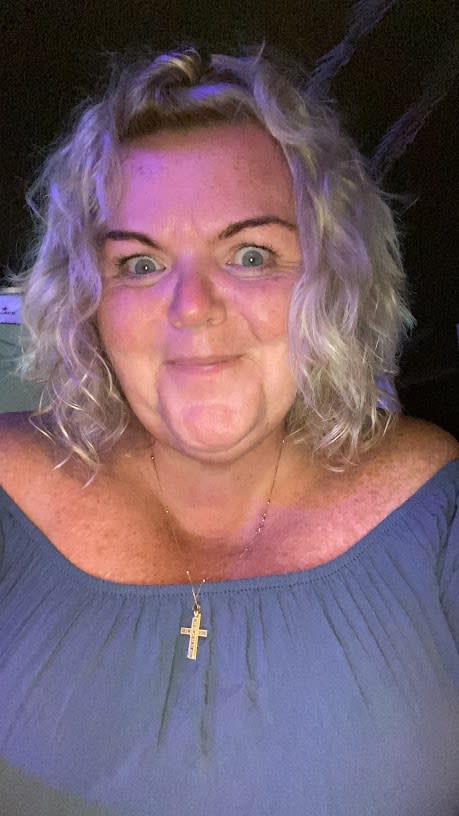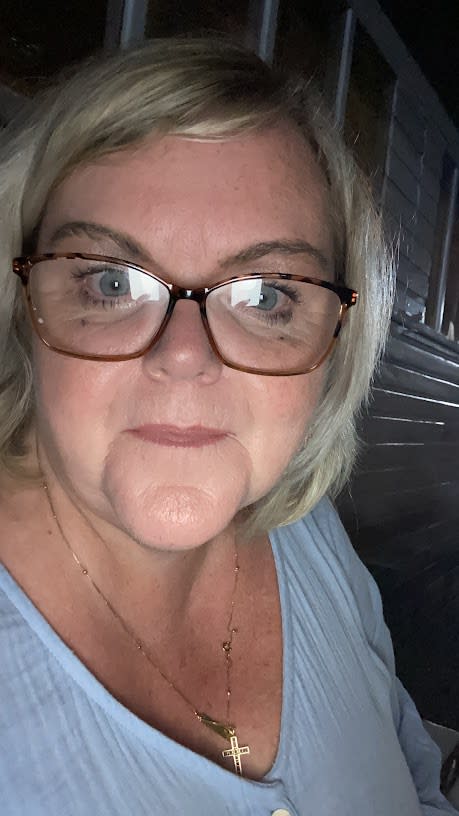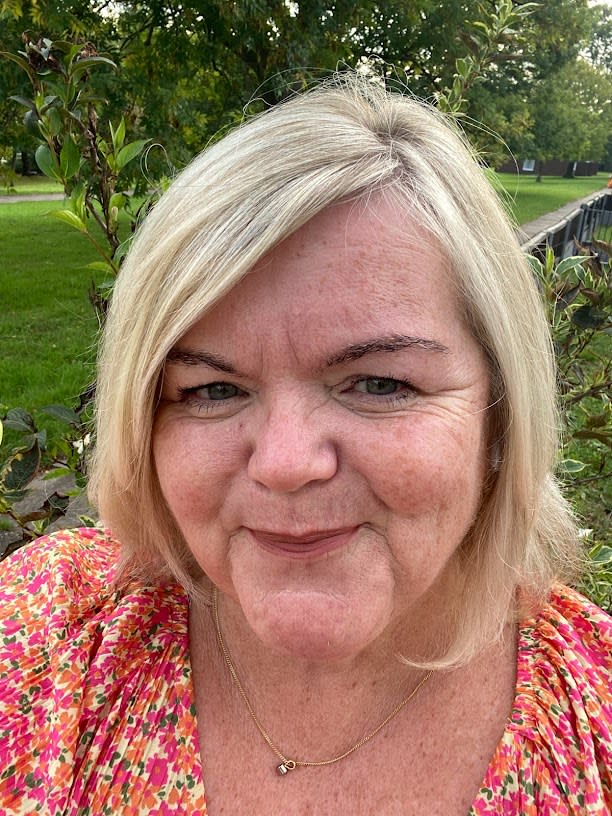Mum forced to sell home and business after strokes left her speaking ‘gobbledygook’ and unable to say children’s names
A mum of three woke up unable to say her name or string a sentence together after randomly having a stroke on a hospital floor, in a “life-changing” event that left her “feeling worthless” and forced her to sell her successful business and house.
Kelly Fogarty, now 54, from Birmingham, was told by one therapist she would never talk again after having a stroke in November 2017, and it has taken years of speech and language therapy for her to be able to learn how to be able to name objects and form complete sentences.
The stroke had put Kelly in a two-day “fog”, which she awoke from speaking “gobbledygook”, and for days she was unaware of her condition, wondering why people looked confused when she spoke.
Already unable to say her children’s names, six weeks after the first stroke Kelly had another.
The second stroke degraded her communication still further and soon she had her privacy stripped from her, as she could not do basic tasks that involved writing or talking, culminating in a mental breakdown and severe depression – as she grieved the life she once lived.

Kelly had been diagnosed with aphasia, which, according to Say Aphasia, is a communication disability which makes it difficult to read, write or speak and occurs when the communication centres of the brain are damaged – usually caused by a stroke, brain haemorrhage, head injury or a brain tumour.
Kelly sold her business, where she was an NVQ assessor in care homes and children’s homes, as she could no longer communicate with her clients, but says her new role has made life “worthwhile” again.
Now, Kelly’s speech has come on leaps and bounds and she helps to teach trainee speech and language therapists at Birmingham City University about her condition.
Kelly explained how her experience with aphasia has changed her perspective on life, saying: “My entire life was turned upside down in one night – I felt like I had nothing to contribute to my life, my children’s lives.
“It was life-changing and I felt totally worthless.

“It taught me not to take things for granted – I still look the same, my illness is invisible to everyone, but it can be paralysing for me.”
Kelly has Crohn’s disease and around three or four times a year she gets an intestinal blockage and has to go to A&E – this happened in November 2017, when she was 48, and Kelly did not think anything of it.
She said: “I went to the hospital and they gave me some morphine. I said goodbye to my kids and that I’ll see them tomorrow – this was normal and something they were used to.”
Little did Kelly and her family know that would be the last day she would be able to communicate normally.
The following morning Kelly woke up on her hospital room floor, which she would later find out was the result of a stroke.

“At four o’clock that morning, I woke up and I was on the floor – I thought that was not normal and had never fallen out of bed,” she said.
“And then I got this feeling that something was not right.
“Next thing you know, I could hear nurses and doctors and saw the curtain close.
“I genuinely thought I might die.
“I just felt terrible, but that didn’t last long because I blacked out.

“I don’t really remember much else.”
For the next two days, everything was “hazy and like a fog” for Kelly.
“My sisters, my dad, my children were all surrounding me when I woke up,” she said.
“A nurse said to me, ‘do you know you’ve had a stroke?’
“And I just thought no, and was trying to explain that I have Crohn’s disease, and I thought she was confused.

“It was actually my speech that she was confused by – I was talking gobbledygook but I thought I was speaking normally.”
Kelly came to the gut-wrenching realisation that the things she wanted to say were coming out as entirely different words.
“I remember having speech and language therapy in the hospital,” she said.
“She did things like point to a ball, and I’d be trying to say ‘ball’, but I’d randomly come out with ‘elephant’ even though I thought I was saying ‘ball’.
“I remember thinking ‘why is she asking me this, of course, I’m saying ‘ball’.

“I couldn’t speak to my children – I couldn’t say their names, or my name, I couldn’t say dad. I only had four words, and that was it.”
Once Kelly got home, six weeks after being in the hospital, she had another stroke, causing her speech to worsen even more.
Her family were incredibly helpful but she felt like all her privacy was stripped away, and she began to feel depressed.
“I’ve never had depression, and all my family were amazing,” she said.
“But, imagine everything in your house, all your things, emails, bank accounts, being checked by your family – everything was completely open.

“All my power had gone – I couldn’t do any of those things.
“I was so angry. I couldn’t even go to a bar or restaurant and order for myself.”
Kelly also found giving up driving difficult – she felt like she could no longer do things for herself.
“I thought I was going to be like this forever,” she said.
“One speech therapist told me I’d never be able to talk again, but a year or so later, another said they should never have said that to me, and it was a myth.
“I remember asking my son to go to the supermarket for me because I couldn’t drive, and I couldn’t even write the shopping list.
“I had a breakdown, and eventually, I went to the doctor and had some therapy.
“They came to my house and talked to me about grief.”
Kelly found herself grieving the life she once had.
“Everything changed in one sleep, and I woke up, and my entire life was upside down,” she said.

“After a year of grief therapy, I was feeling a bit better.
“But, I had to close my company – I worked for myself helping people get NVQs, and when you work for yourself and can’t work, you don’t get any money.
“I had to finish my mortgage on my house and downsize too.
“It just wasn’t my plan. A stroke wasn’t my plan, and struggling to talk wasn’t my plan.”
Eventually, Kelly’s speech improved after two rounds of one-to-one speech therapy and plenty of practice on her own at home.
She now works at Birmingham City University, explaining to speech and language students what aphasia is and helping them communicate with people with aphasia.
She said: “I’m an experience expert, so the students learn the theory, and I give them the experience of working with someone with aphasia.
“It’s helped me because in my other life I would train people and talking is my therapy.
“It makes my life worthwhile.”
When Kelly tells people she has aphasia, she said barely anyone knows what it is.
“People don’t have a clue,” she said.
“I wish there was more exposure about aphasia.
“Even when I went to stroke support groups, a lot of people seemed to have aphasia, but didn’t know.”
For more information on aphasia, visit: www.sayaphasia.org


